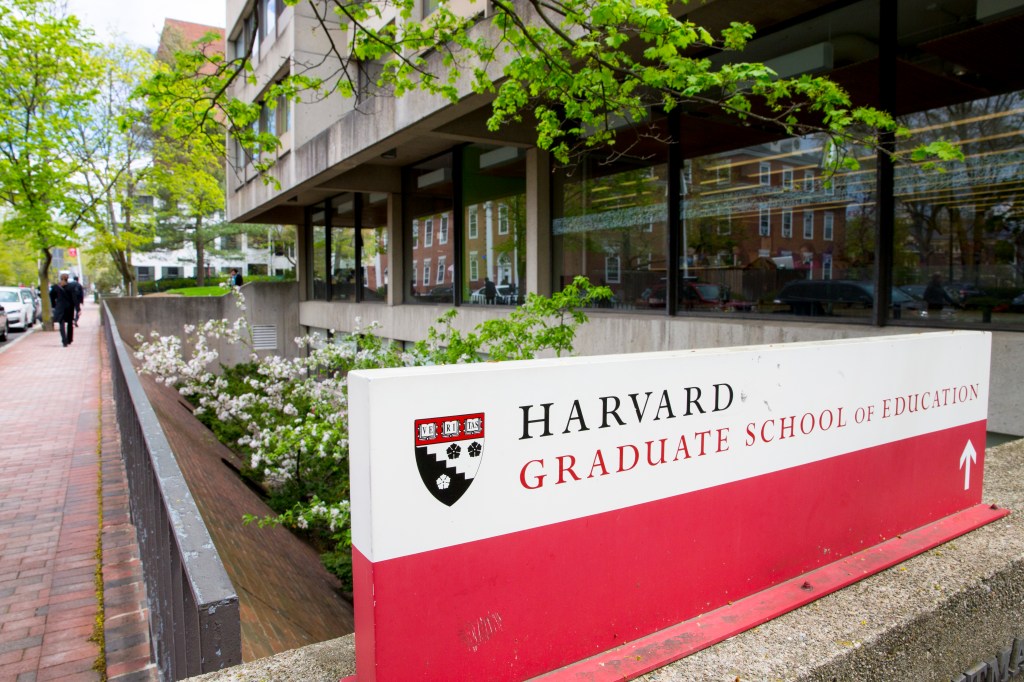10 HBCU leaders attended the HGSE Seminar for New Presidents as part of Clark Atlanta University and Harvard University partnership

By Laurie Rodriguez | November 7, 2025
This summer, 10 presidential fellows from Clark Atlanta University’s historically Black colleges and universities Executive Leadership Institute (HBCU ELI) completed Harvard’s Seminar for New Presidents, a distinguished leadership program based at the Harvard Graduate School of Education (HGSE). During the seminar, the presidential fellows said they learned that despite hailing from different institutions and geographies, they faced similar challenges and could benefit from each other’s ideas and strategies.
The presidential fellows’ participation in the seminar was supported by HGSE and the Harvard & the Legacy of Slavery (H&LS) Initiative. The Seminar, founded by Judith Block McLaughlin in 1990, senior lecturer emerita of the HGSE, provides a practical orientation to the presidency for new presidents as they participate in expert faculty-led sessions and discussion groups that familiarize them with the diverse range of responsibilities and wide array of challenges that await them in their new role.
“This partnership between Clark Atlanta University and Harvard University acknowledges the pivotal role well-equipped leadership plays in shaping the trajectory of HBCUs and, by extension, the broader landscape of higher education,” says Phyllis Worthy Dawkins, executive director, HBCU Executive Leadership Institute at Clark Atlanta University. “The hands-on experiences and insights our fellows gain will be further enriched as they engage in thought leadership and innovation at Harvard University.”
A Network of Colleagues
The presidential fellows from HBCU ELI joined a group of presidents from all sectors – colleges, universities, and community colleges – from across the country.
James R. Martin, the Chancellor of North Carolina Agricultural and Technical State University and an HBCU ELI Fellow, is an accomplished civil engineer, who has led science, technology, engineering, and math initiatives at three large public research universities (University of Pittsburgh, Clemson University, Virginia Tech). Martin has also promoted academic innovation throughout his career, such as founding Virginia Tech’s Disaster Risk Management Institute and serving as the founding executive director of the Risk Engineering and Systems Analytics Institute at Clemson University.
Martin noted that the Seminar represented institutions of various sizes, types, and locations with largely the same issues – funding resources, political pressures, enrollment challenges, infrastructure needs, and more. However, he found that solutions may vary for similar challenges.
“These common problems are all solved differently depending on the institution, current state of the institution, and trajectory,” said Martin. “Seeing, hearing, and discussing these highly diverse solutions improved my ability to think in fresh ways and be more creative. This was one of the most valuable aspects [of the Seminar].”
HBCU ELI Fellow, S. Keith Hargrove is the new chancellor of Elizabeth City State University. He is a self-described strong proponent of student achievement and a seasoned leader who has worked at three HBCUs (Tuskegee University, Tennessee State University, Morgan State University), as well as a former engineering professor and dean. He noted that the Seminar provided perspectives about the great responsibility presidents and chancellors have. Hargrove found the opportunity to gain insights from past presidents helpful in his new role.
“The Harvard program highlighted the importance of the knowledge, experience, and competencies you bring to the role that are essential to your success and the advancement of the institution,” said Hargrove. “The opportunity to learn from past presidents through sharing and advice was indeed a highlight for me and helped me focus more on the commitment to serve and make an impact at my institution.”
This partnership between Clark Atlanta University and Harvard University acknowledges the pivotal role well-equipped leadership plays in shaping the trajectory of HBCUs and, by extension, the broader landscape of higher education.
Phyllis Worthy Dawkins
The collaboration between HBCU ELI and Harvard University advances one of the H&LS Initiative’s three strategic priority areas – deepening partnerships with HBCUs, which is grounded in the Report of the Presidential Committee on Harvard & the Legacy of Slavery.
“The Seminar for New Presidents offers an enormous opportunity for fellows in the HBCU ELI program to network, share knowledge, and learn from experienced leaders. At the same time, other university and college leaders learn from the unique experiences of HBCU leaders,” said Sara Bleich, the vice provost for special projects at Harvard University and leader of the H&LS Initiative. “The partnership between Clark Atlanta University and Harvard is a part of building a strong foundation for the next generation of academic leaders.”
Freeman A. Hrabowski III, president emeritus of The University of Maryland, Baltimore County, led a session during the Seminar. He said the Seminar creates a network of colleagues the new presidents can rely on.
“The job can be very lonely, and it really helps to make connections so that they can call colleagues during difficult times and exchange ideas,” Hrabowski said. “Participants also appreciate hearing from those of us who have had years of experience in the position. We learn from each other.”
